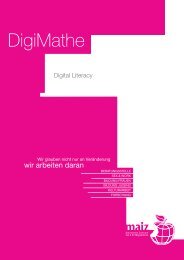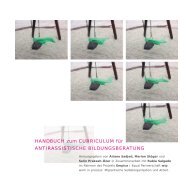Handbuch zur Einführung - Maiz
Handbuch zur Einführung - Maiz
Handbuch zur Einführung - Maiz
Sie wollen auch ein ePaper? Erhöhen Sie die Reichweite Ihrer Titel.
YUMPU macht aus Druck-PDFs automatisch weboptimierte ePaper, die Google liebt.
Definition von „mathematischer Kompetenz“ nach Eric Gutstein<br />
„Students need to be prepared through their mathematics education to investigate and critique<br />
injustice, and to challenge, in word and actions, oppressive structures and acts – that is, to ‘read<br />
and write the world’ with mathematics. … essentially to read the world is to understand the<br />
socio-political, cultural-historical conditions of one’s life, community, society and world; and to<br />
write the world is to effect change in it. I contend that mathematics education can serve the larger<br />
struggle for human emancipation … I also argue that teachers (…) need to conceptualize themselves<br />
as ‘transgressive’ (…), see their role as part of larger social movements, and explicitly attempt<br />
to create conditions for (…) people to become active participants in changing society.” 6<br />
„For me, reading the world with mathematics means to use mathematics to understand relations<br />
of power, resource, inequities, and disparate opportunities between different social groups and to<br />
understand explicit discrimination based on race, class, gender, language, and other differences.<br />
Further, it means to dissect and deconstruct media and other forms of representation. It means<br />
to use mathematics to examine these various phenomena both in one’s immediate life and in the<br />
broader social world and to identify relationships and make connections between them.” 7<br />
(Zur Bedeutung dieser Differenzen für die im Rahmen des Projekts entwickelten Kurse siehe unten.)<br />
3. Mathematik in der Erwachsenenbildung<br />
3.1 Allgemeine Problemfelder<br />
In der von uns durchgesehenen Forschungsliteratur werden für das Fach Mathematik in der Erwachsenenbildung,<br />
das heißt nicht spezifisch für die Zielgruppe Migrant_innen, folgende Problemfelder identifiziert:<br />
• Forschungsdefizit: In der internationalen Forschungscommunity herrscht Einigkeit darüber,<br />
dass es einen großen Nachholbedarf sowohl an Forschung wie auch an Theoretisierung des<br />
Problems der „Adult Numeracy“ gibt. Dies gilt insbesondere für die Frage, welche staatlichen<br />
Politiken und welche Bildungs- und Förderungsmaßnahmen ergriffen werden sollten um<br />
diese Defizite zu minimieren. 8 Es gibt, so ein Ergebnis unserer Literaturrecherchen, gerade<br />
im deutschsprachigen Raum kaum tiefergehende Untersuchungen <strong>zur</strong> Mathematikkompetenz<br />
Erwachsener oder auch zu den Kompetenzen, die für Erwachsene im Sinne einer angewandten<br />
Alltagsmathematik wichtig wären. 9<br />
• Transferproblem / Diskrepanz Schulmathematik – Alltagsmathematik: Durch viele internationale<br />
Studien gut dokumentiert ist die Tatsache, dass die Schulmathematik, wie sie immer<br />
noch gelehrt wird, keine ausreichende und adäquate Basis für alltagsmathematische Problemstellungen<br />
Erwachsener liefert, ja, dass schulmathematisches Wissen sogar dem informell<br />
erworbenen alltagsmathematischen Wissen und Können entgegenstehen und dieses behindern<br />
6 Gutstein (2006), S 4<br />
7 ebd. S 25<br />
8 Im Original: “under-researched and under-theorised”; Carpentieri et al (2010)<br />
9 vgl. Gustafsson/Mouwitz (2007), S 4<br />
Einleitung 11







